The Phantom Candidate
I never understood John Edwards' appeal. I therefore do not expect that Elizabeth Edwards' new book, or the tiresome media blitz accompanying its publication, will bring a sudden change in my thinking.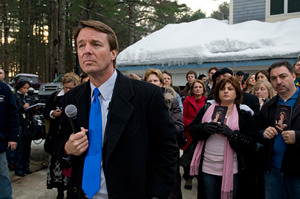
I never understood John Edwards’ appeal. I therefore do not expect that Elizabeth Edwards’ new book, or the tiresome media blitz accompanying its publication, will bring a sudden change in my thinking.
I first saw Edwards at one of his early presidential campaign events in New Hampshire during the summer of 2003, and was mystified. He’d pulled up to a small brick plaza in his campaign bus, adorable children in tow, and, as I recall, with John Mellencamp’s “Small Town” playing as theme music. The song was meant to resonate with rural voters and it was odd to hear an ode to country life at lunchtime in downtown Manchester, which is not particularly small, nor rural nor Southern. But son-of-a-poor-millworker was Edwards’ shtick for the 2004 campaign, and he was sticking to it.
Not much distinguished Edwards from the rest of the Democratic pack, except that he had less experience in office than did his chief rivals, John Kerry and Howard Dean. He wasn’t associated with a cause, as was Dean with opposition to the Iraq war, or Kerry, who started his political career as a military man who opposed the Vietnam conflict. Edwards hadn’t authored an important piece of legislation, and he didn’t push a campaign proposal that was anything but generically Democratic.
Edwards hadn’t finished his single term as North Carolina’s senator when he ran for president, so he had a slim public record. Much of what was known about him came from his own account of his passionate representation of wronged families he’d represented as a trial lawyer, a calling that made him rich.
No one could predict that Edwards’ political life would end in such a spectacular flameout, with the disclosure that he’d had an affair — and possibly a child — with a campaign videographer. He and his outwardly noble spouse Elizabeth hid this from voters, campaign staffers and contributors even as he was campaigning in 2008 as a family values man who valued, in particular, his relationship with his cancer-stricken wife. Now we learn that Edwards is under investigation for possibly funneling campaign funds to the mistress, and he has released a perfectly parsed statement that says “no funds from my campaign” were used improperly. That pointedly leaves out money that could flow from the labyrinth of his other political organizations. I am sure federal prosecutors can sort all this out.
Still we should not be so concerned with Edwards as another self-absorbed politician who engages in self-destructive behavior. I worry more that Edwards became a two-time presidential contender and the 2004 vice presidential nominee based on little but his own preening.
This was enough to set the media-political complex agog, not once but twice.
Few dwelled on Edwards’ decision to forgo a re-election campaign in North Carolina — where early polls suggested uncertain chances for victory. By the end of the 2004 Democratic primaries, Edwards had won just two contests, in South Carolina and in North Carolina, where his caucus victory came after he had formally dropped out. Still he was taken seriously enough to be pushed (by himself, the promoters of media conventional wisdom and other hangers-on) as Democratic nominee Kerry’s running mate.
Edwards was a Southerner and a good campaigner, and Democrats needed to win a Southern state, the argument went. Overlooked was the fact that the party’s presidential nominee in 2000 was Al Gore, a Southerner who struggled in the region, as have most contemporary Democrats.
When Edwards ran again in 2008, another point was too easily ignored: He’d failed to carry his home state for the Democrats in 2004, and in fact didn’t come close. This used to be considered a sin of grand proportion, but somehow Edwards escaped blame. It did not make many media pundits or grass-roots organizers or the loud “netroots” lobby note that perhaps a candidate who couldn’t bring in North Carolina’s electoral votes in 2004 couldn’t be expected to win nationally in 2008.
That Edwards was considered in the “top tier” of 2008 candidates was always a bad joke.
All campaigns are about imagery and manipulation. But stripping away this gloss is supposed to be one of the media’s jobs, or at least it used to be. That we helped create Edwards as a national figure and now cover his wife’s book promotion as a worthy story is a measure of not just what’s gone wrong for them, but what’s wrong with us.
Marie Cocco’s e-mail address is mariecocco(at)washpost.com.
© 2009, Washington Post Writers Group
Your support matters…Independent journalism is under threat and overshadowed by heavily funded mainstream media.
You can help level the playing field. Become a member.
Your tax-deductible contribution keeps us digging beneath the headlines to give you thought-provoking, investigative reporting and analysis that unearths what's really happening- without compromise.
Give today to support our courageous, independent journalists.
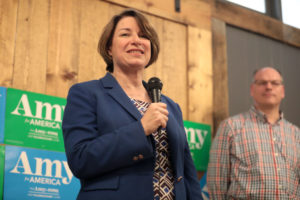
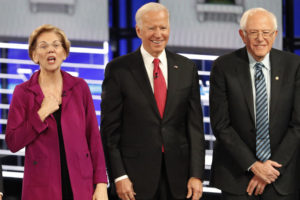

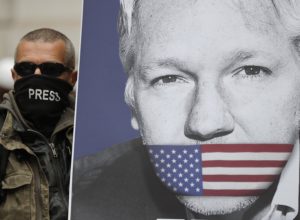

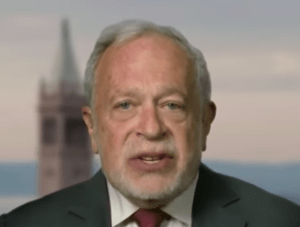
You need to be a supporter to comment.
There are currently no responses to this article.
Be the first to respond.